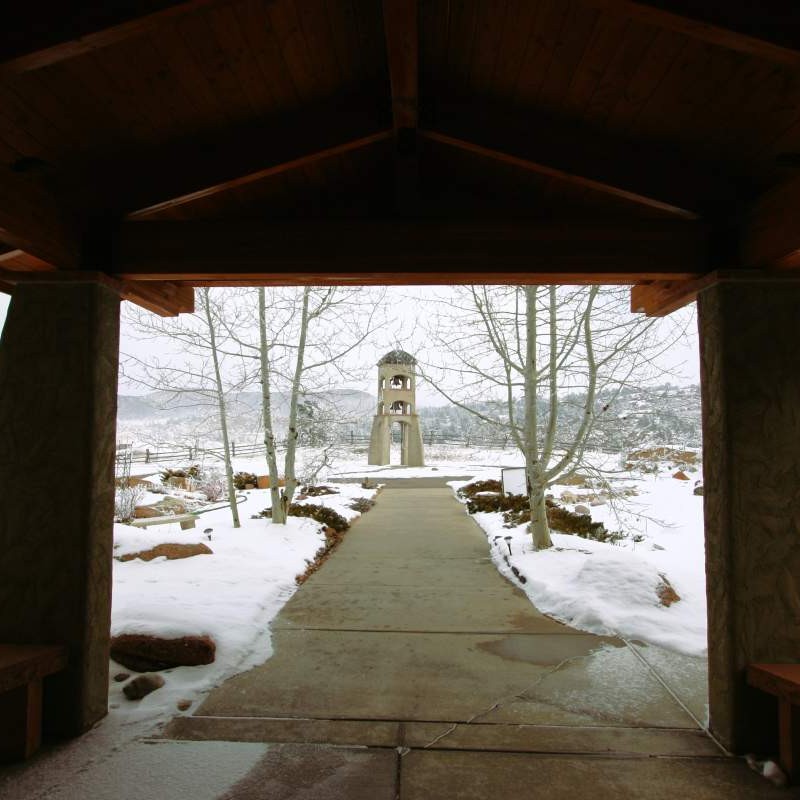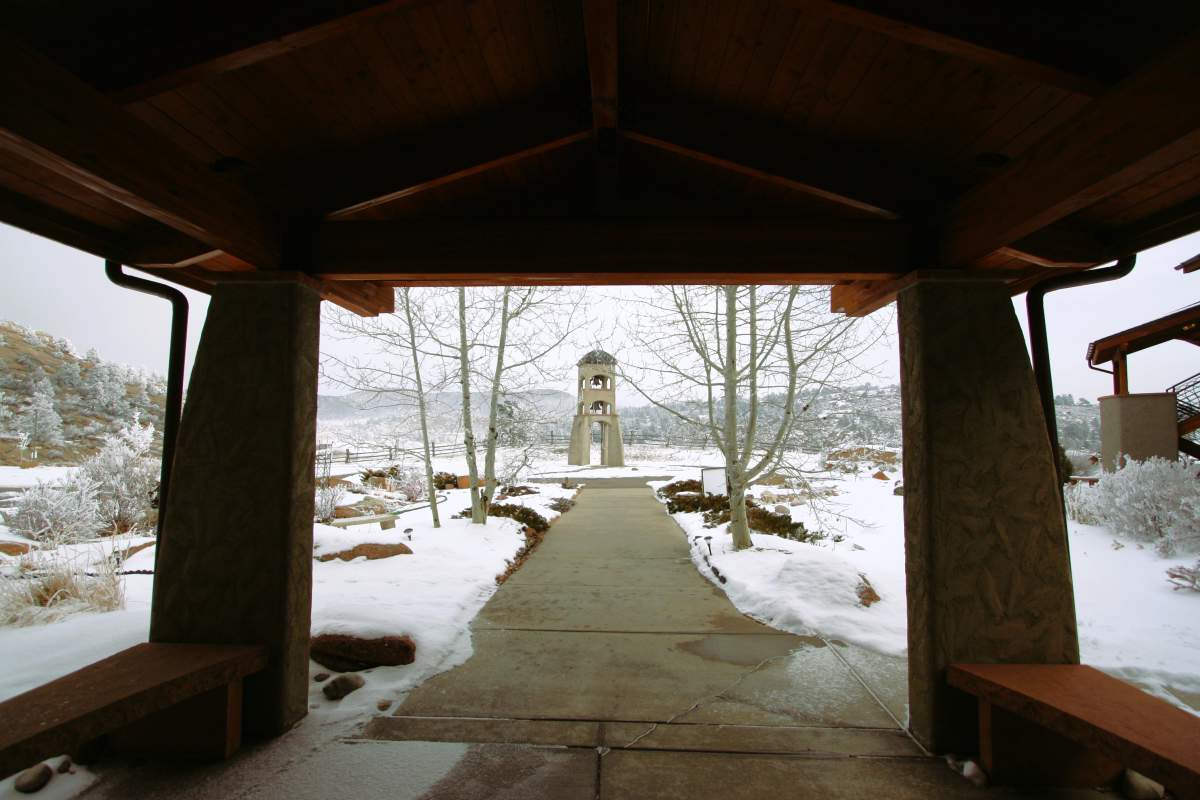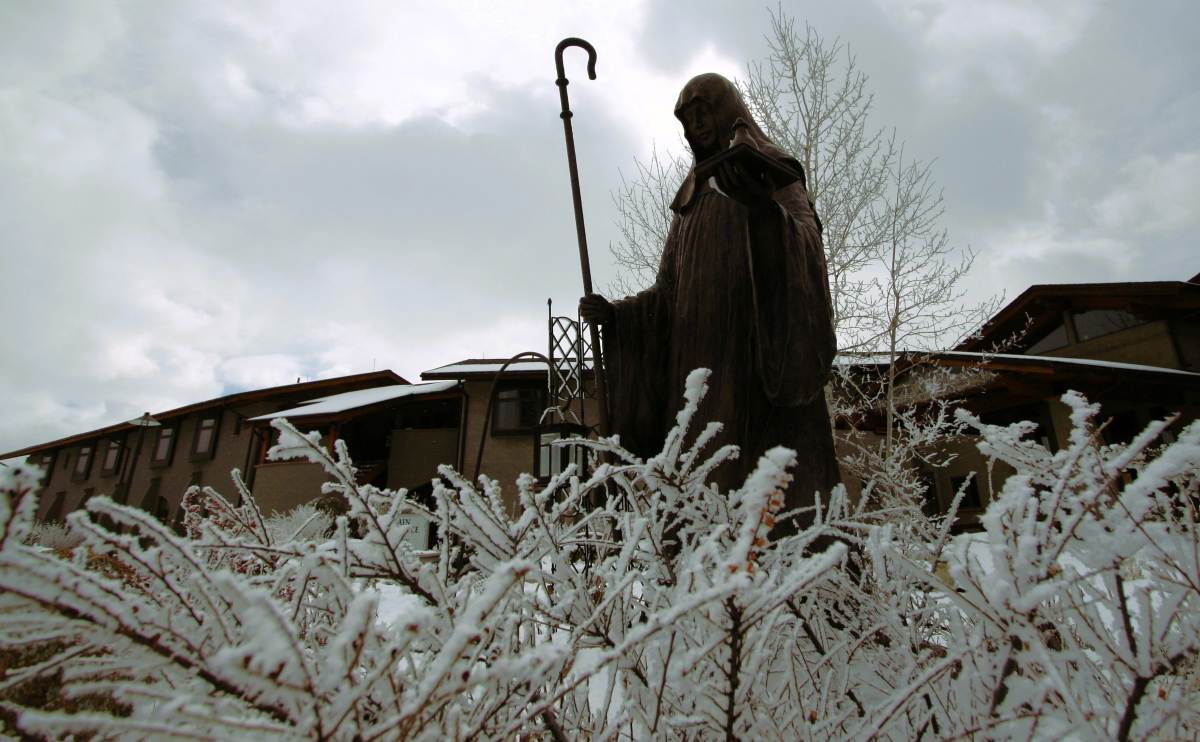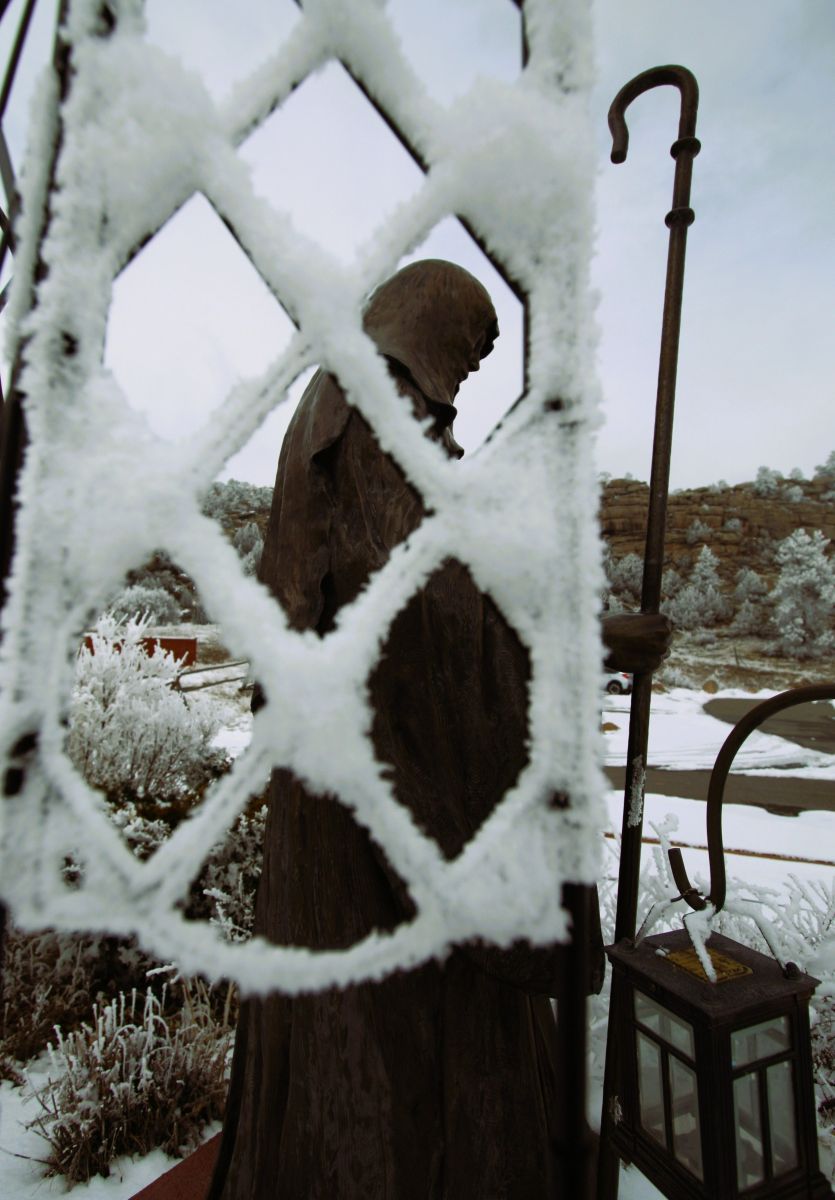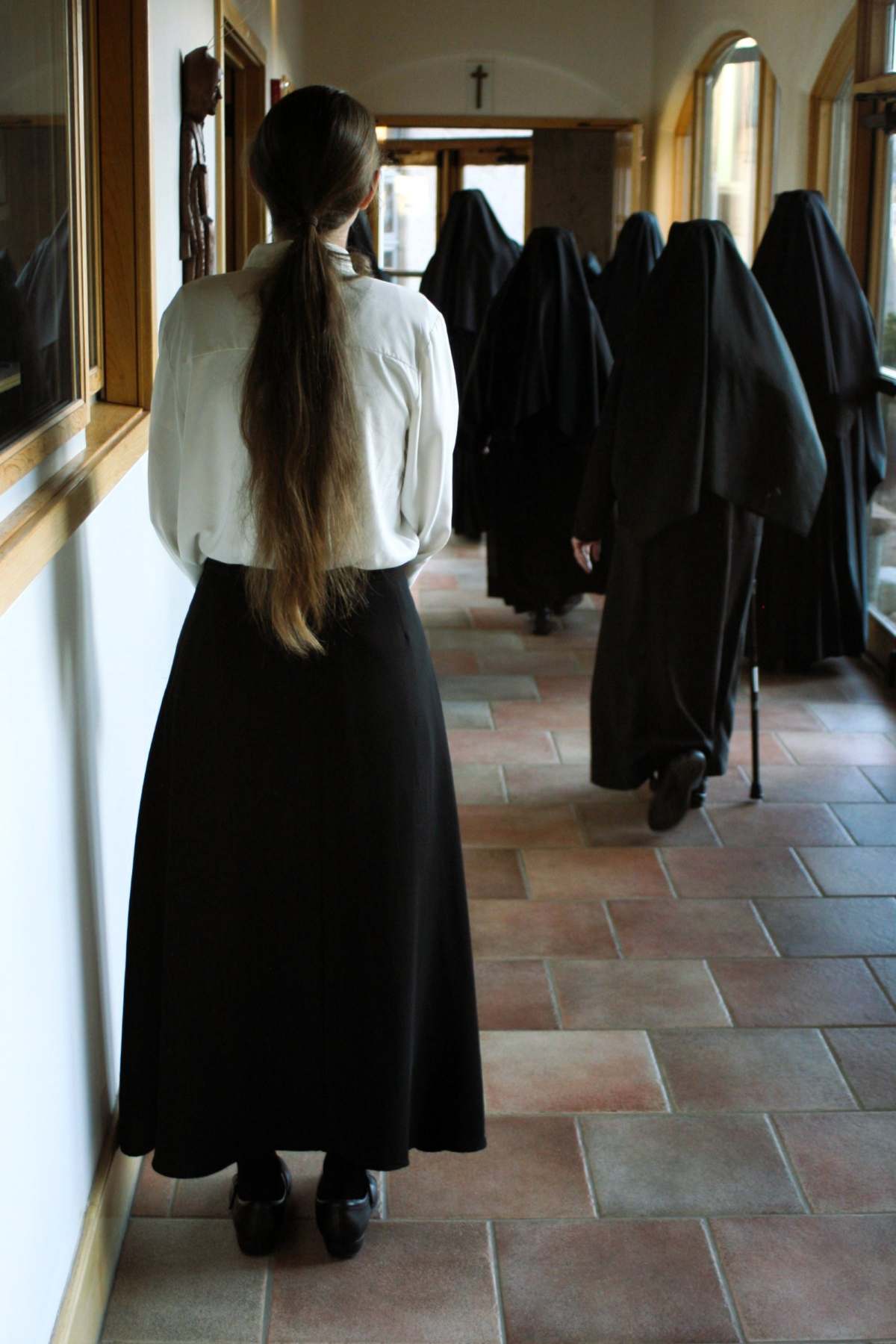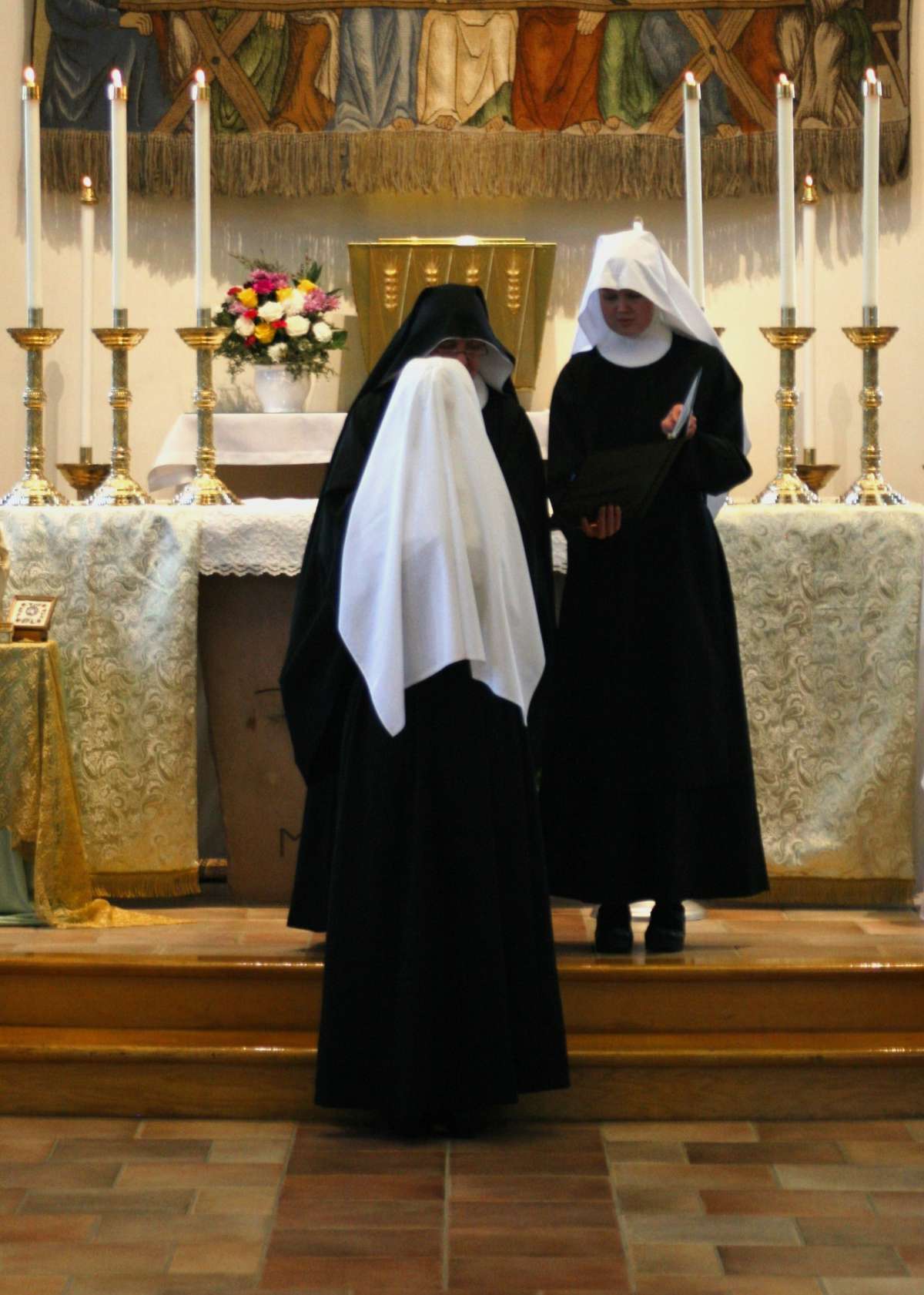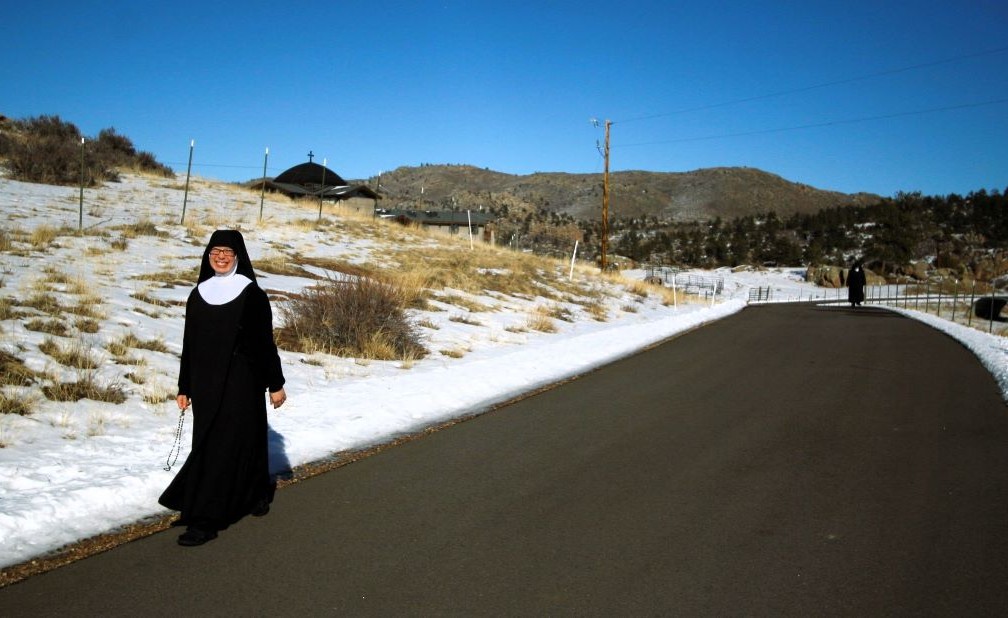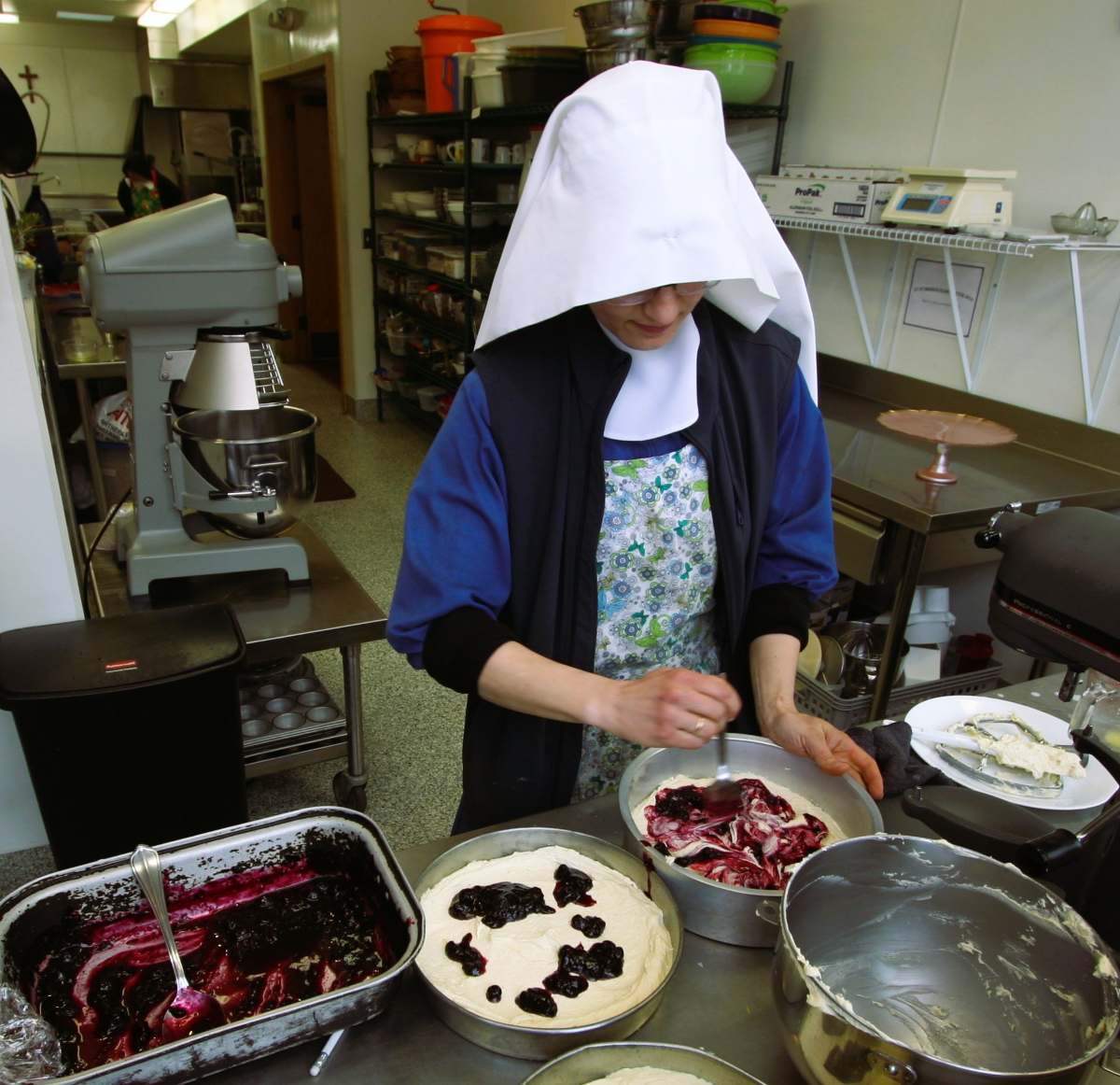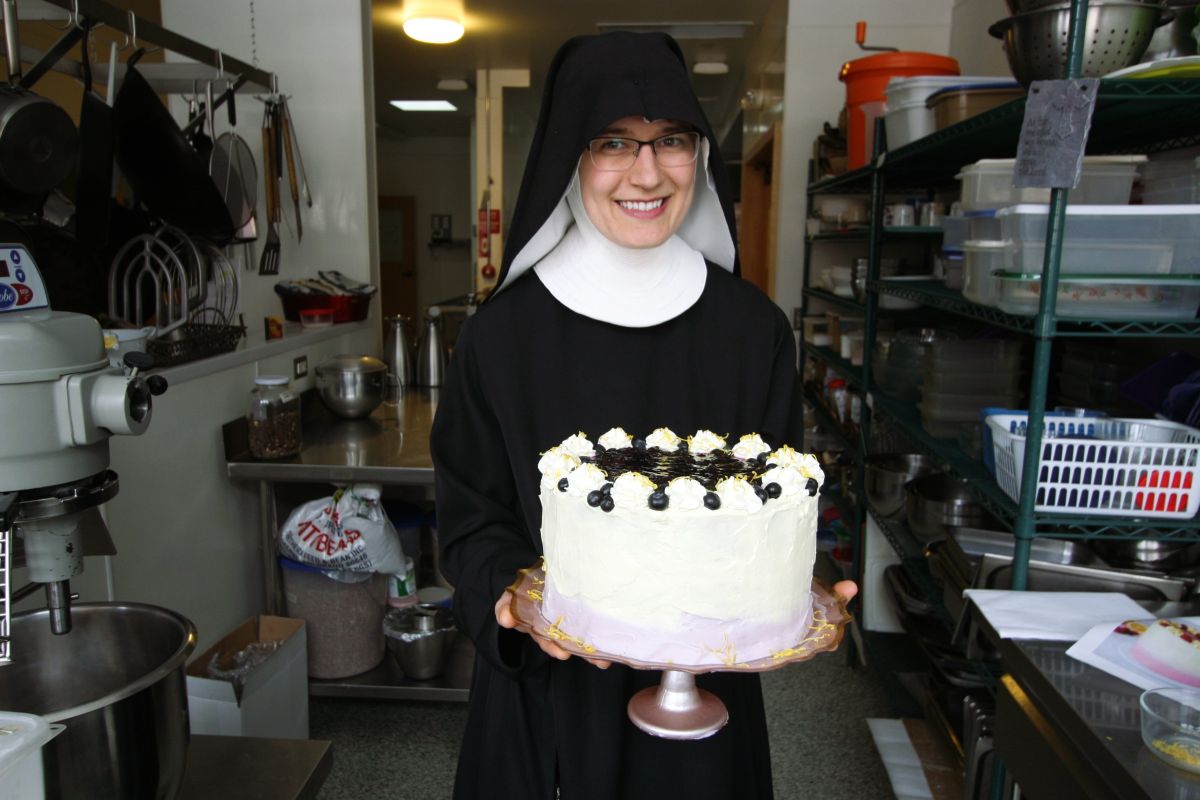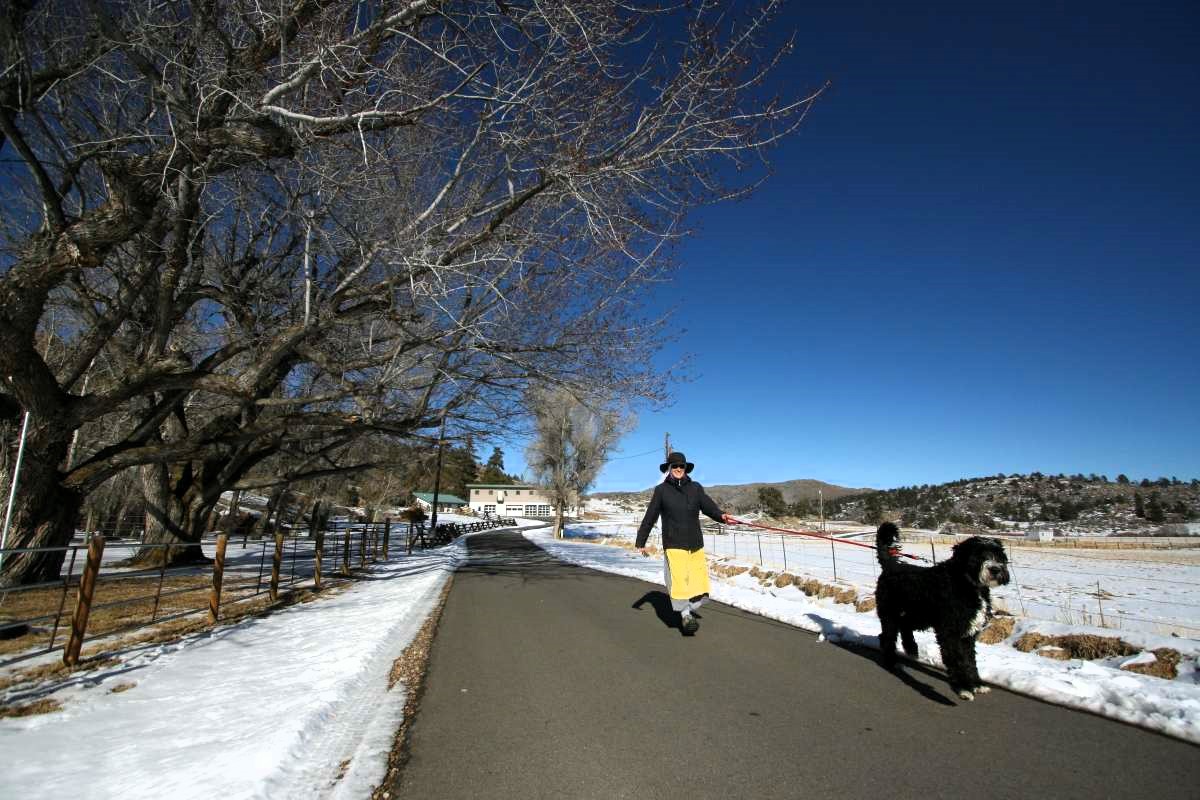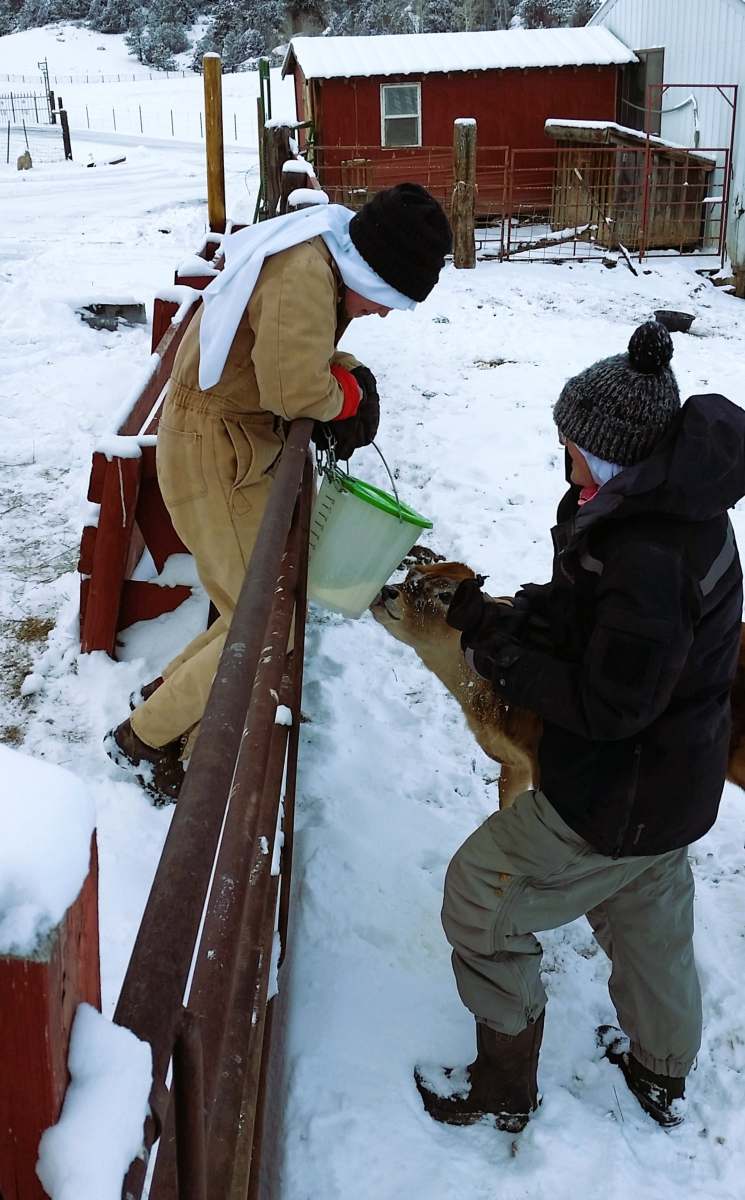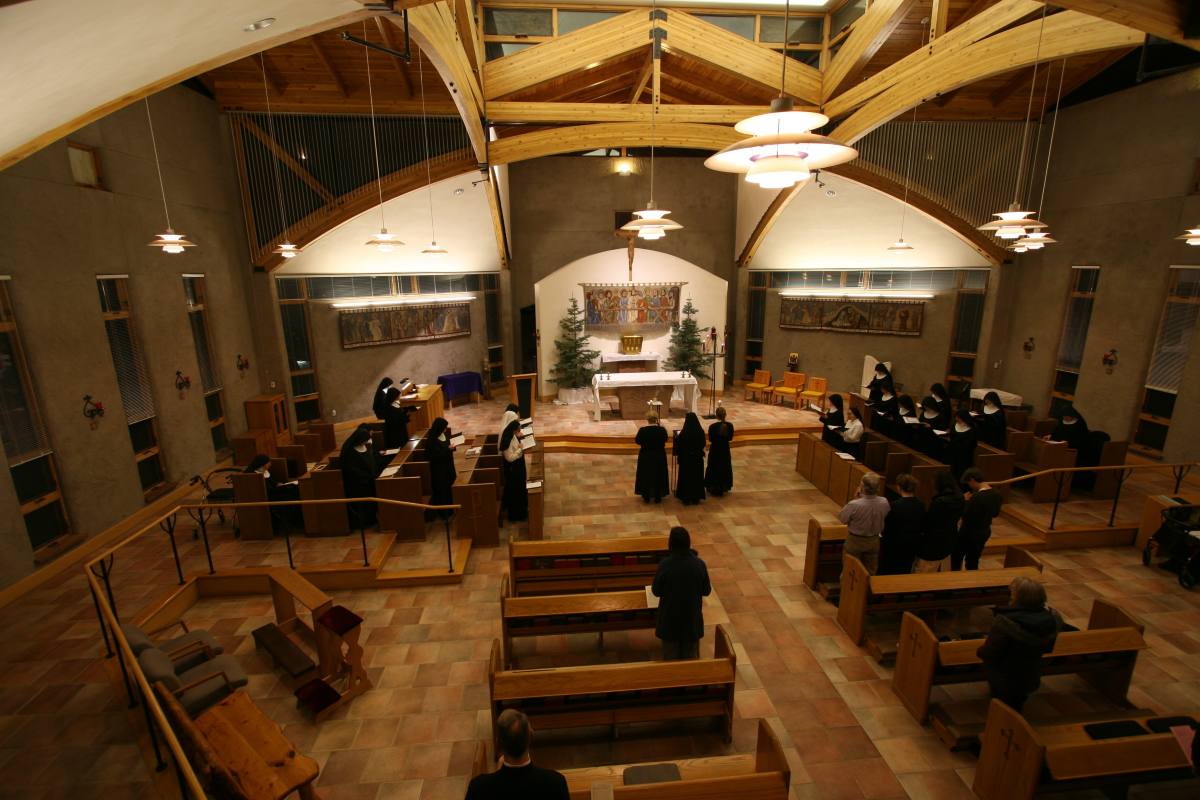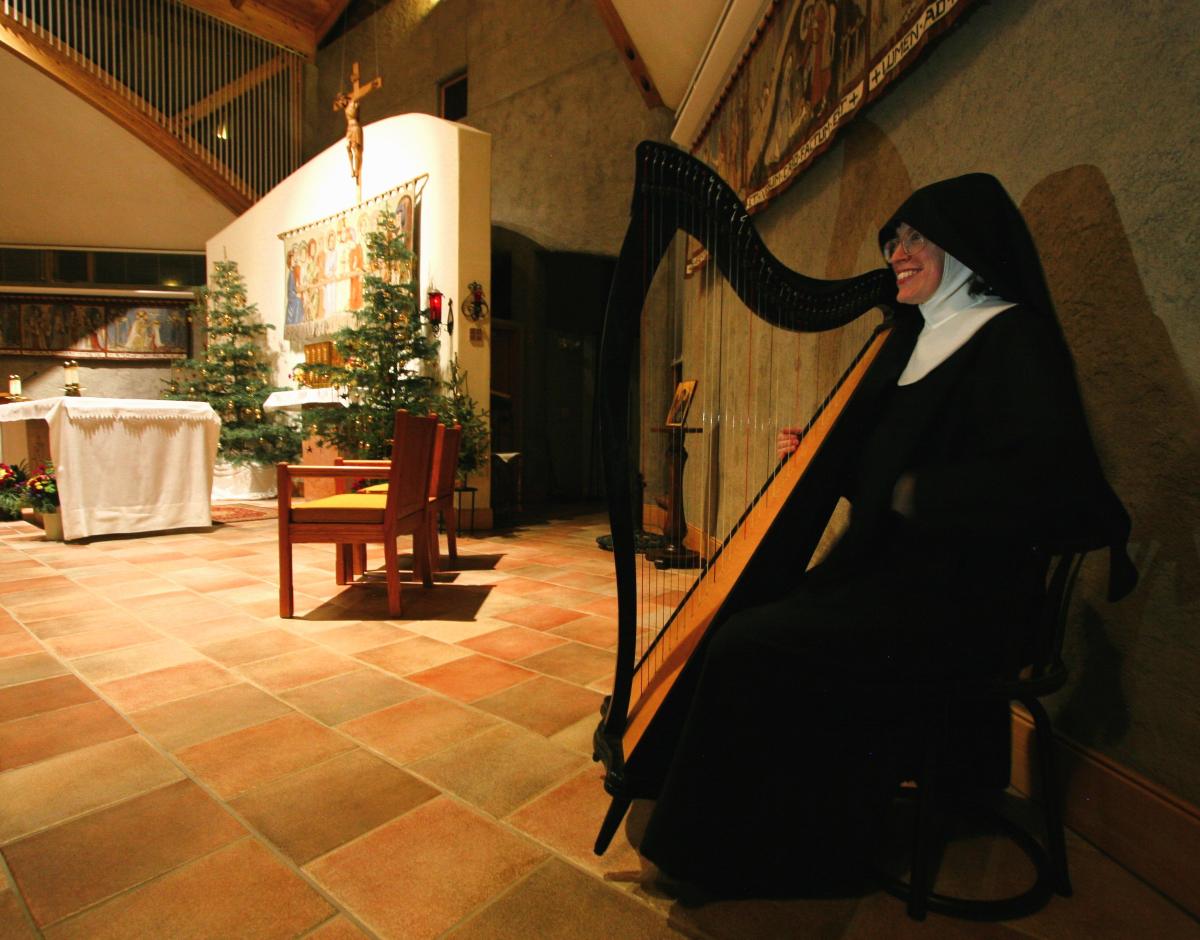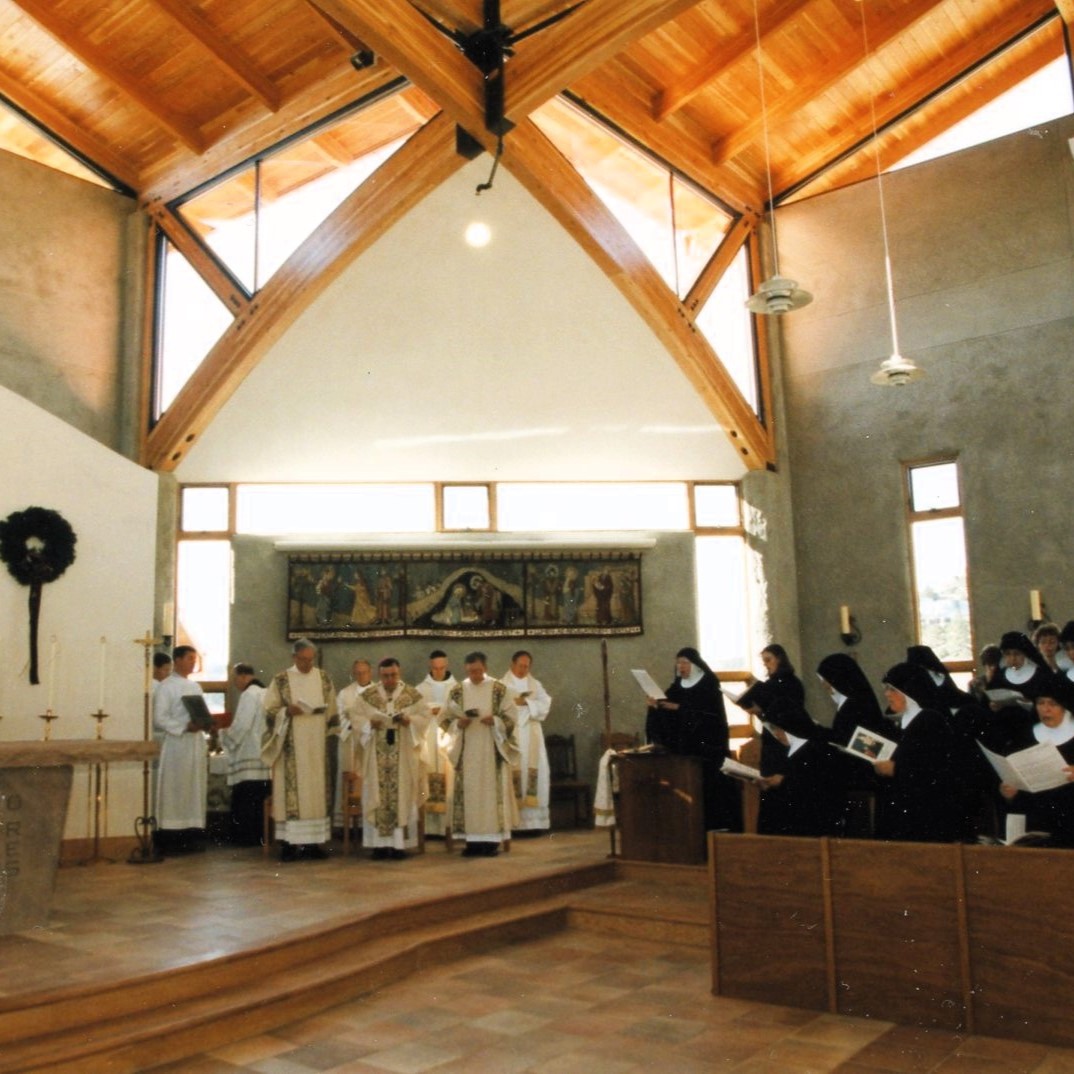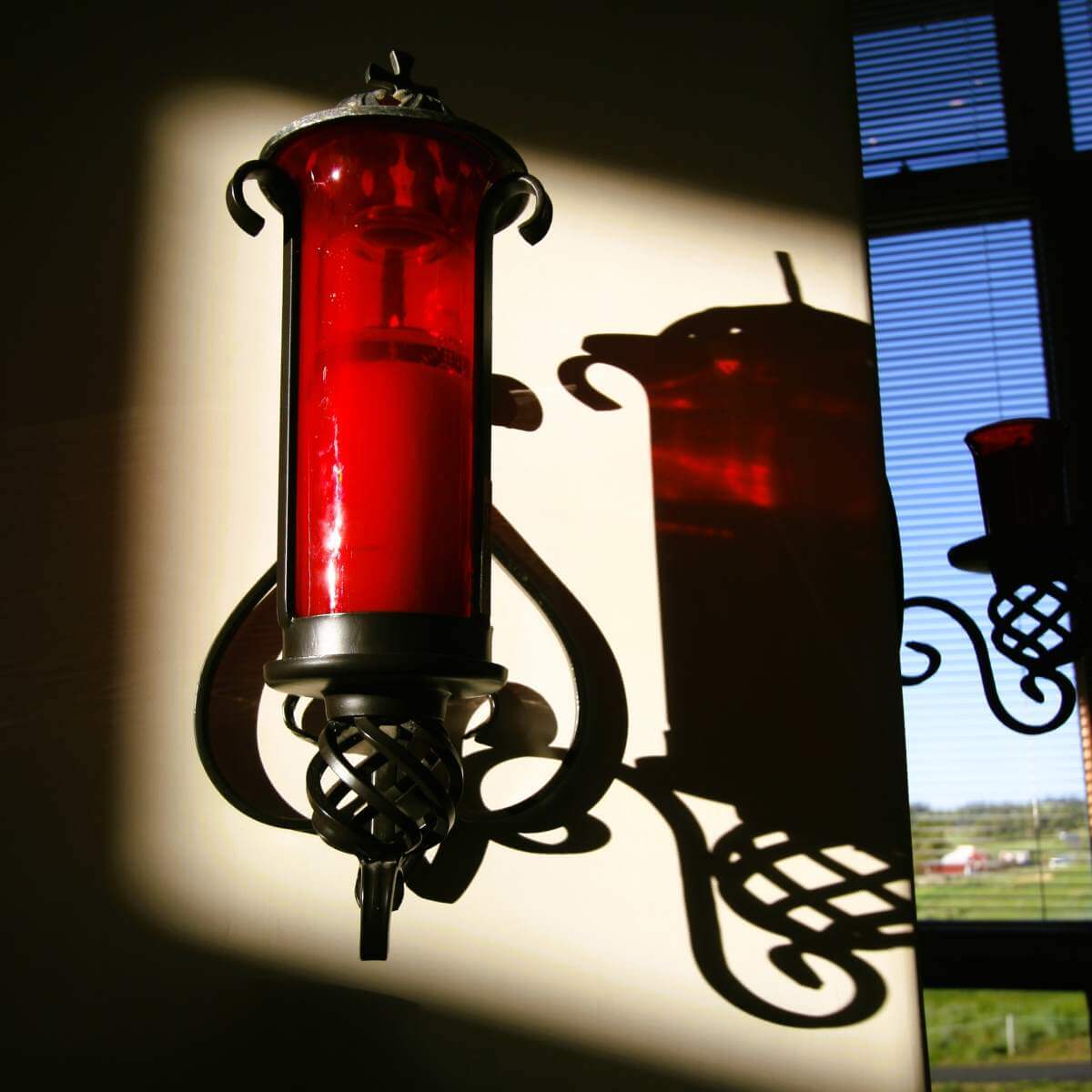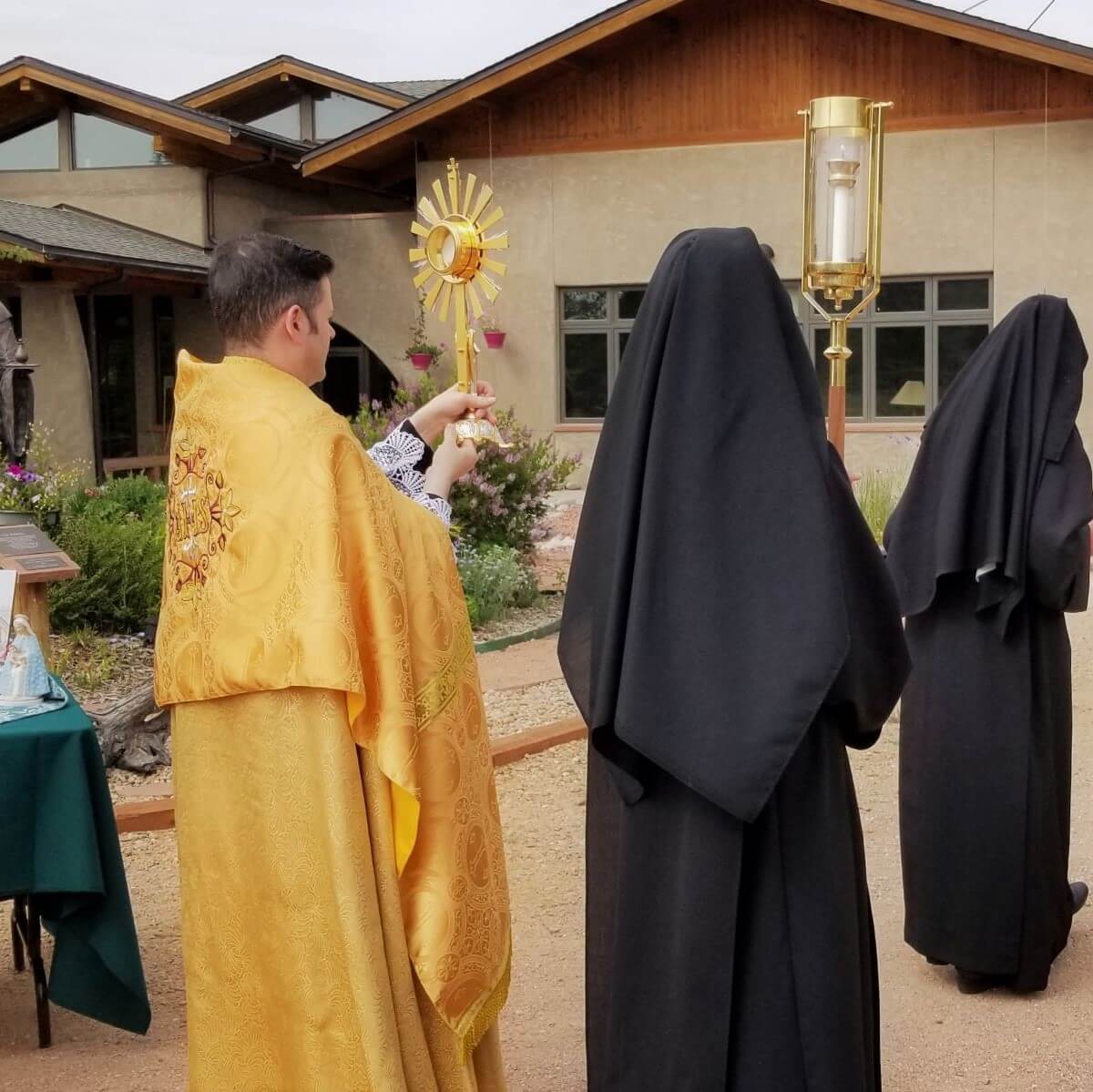Below is a slideshow of an assortment of photos from this winter, including the blessing of snow, the investiture of our new Novice, Sister Rosemary, our liturgy, some of our farm animals, and the creation of a cake to help raise money for St. Joseph Catholic School in Fort Collins.
Tag: Church
Our Chapel’s 25th Anniversary
A reflection by our Abbess, Mother Maria-Michael Newe, OSB
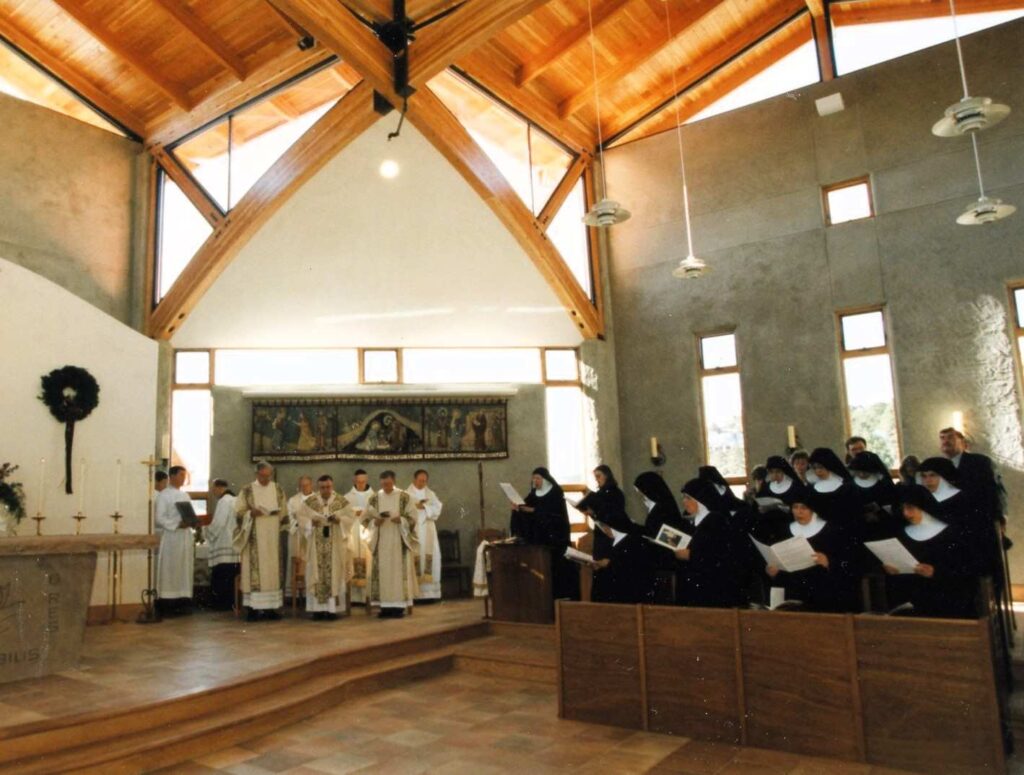
The Dedication of our Abbey Church, November 7, 1999
Twenty-five years have slipped by since our Chapel was completed. The most important parts of our lives take place in this sacred place. It is here we begin by knocking on the door at our entrance, and here we say our final “good-bye” to our beloved Sisters.
Chapter 19 of the Rule of St. Benedict talks about how we should say the Divine Office: “We must always remember, therefore, what the Prophet says: Serve the Lord with fear (Ps 2:11), and again, Sing praise wisely (Ps 46[47]:8); and, In the presence of the angels I will sing to you (Ps 137[138]:1). Let us consider, then, how we ought to behave in the presence of God and his angels, and let us stand to sing the psalms in such a way that our minds are in harmony with our voices” (RB 19:3-5). I love that. We are assisting the angels! And we have to work that our mind might be in harmony with our voices. We know what a work of love that is. There is no work to be preferred to this, and we should celebrate the Divine Office with joy and solemnity.
“I rejoiced when I heard them say, ‘let us go to the house of the Lord’” (Ps 122:1). We have access at all times to the Chapel. So we have a reason to rejoice! In this place, our souls come to rest in the very Presence of Jesus Christ Our Lord…And the Holy Spirit fills our hearts with the conversations…What a gift.
It is in this Chapel that we give the best of ourselves. In Psalm 37 we hear, “Once I was young, and now I am old…” (Ps 37:25). Our Chapel watches the passage of time. Our bodies age, but our souls only get richer. You can feel that. There is a certain dignity that starts growing in you. There is no fear in ageing, because there is something beautiful happening within us.
Our Chapel is dedicated to the Mother of God. The tapestries, which hang along the walls, tell the story of the Blessed Mother’s life. Her most important moments are in the Chapel as well, and are united with ours. We have her motherly intercession and her powerful intercession. Nothing goes unnoticed by her. And the wonderful thing is that she cares.
So let us celebrate with heartfelt gratitude and joy this day. Every day, we receive the Body and Blood of Our Lord Jesus Christ in this Chapel. Who could want more? Twenty-five years ago this Abbey Church was dedicated (and believe me, that altar received a ton of oil; I remember the Archbishop spreading the oil all over with great delight…all of the corners, Monsignor Newman and Deacon Bud, they went around to all of the crosses in the Church and put oil on them while we prayed). May it bear our hearts and souls to the heights of the heavens. Let us sing with our minds and hearts in harmony, that this day of great blessings will see a showering of graces that we pray shall never end. This is God’s dwelling place, and He has made it holy. We call on His name, for scripture says: There, you will find Him.
As you sing, sing very purposefully. The measure you put in to it is the measure you are going to get out. There is something special in the liturgy for each person, and it is a jewel ready to be found—Find it and take care of it, because it will be given to no one else but you. May this bring us all to holiness.
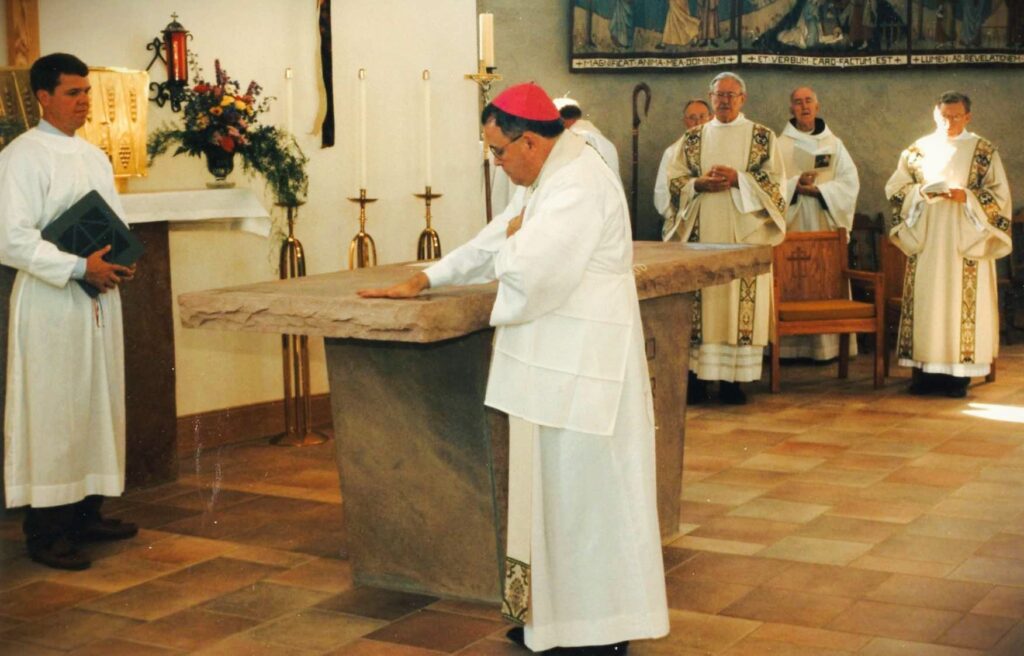
Archbishop Chaput anointing the altar with oil
Church Dedication Anniversaries
A reflection by Mother Maria-Michael Newe, OSB
This is a festive season for Church Dedication Anniversaries, with the feast of the Dedication of the Cathedral Basilica of the Immaculate Conception in Denver on October 27, the solemnity of the Dedication of our own Abbey Church on November 7, and the feast of the Dedication of the Basilica of St. John Lateran in Rome on November 9. Reflecting on the theme of beautiful cathedrals, Mother Maria-Michael Newe, OSB reminds us that our souls, too, are temples dedicated to the Lord.
In the liturgy for the anniversary of the Dedication of a Church, we get to sing that lovely antiphon: “This is the house of God, the gate of heaven.” We say this of our churches, but our souls are also like churches – truly, little houses of prayer and worship. Each one of us should be a place where all can come and ask for prayer. As Benedictines, we love our Church, we treasure our Church, we protect our Church – and we should protect the church within ourselves as well. Think of the beautiful cathedral in Denver, or any of the stunning cathedrals around the world, and know that your soul far outruns them. Your soul is far more beautiful than any one of them, and to keep it that way is important.
In the history of the Denver Cathedral, right before the dedication was to take place, a lightning bolt struck Preview (opens in a new tab)one of the towers and knocked it down; but they just built it right back up and got it ready! I think that’s what we do, too, sometimes, when we get knocked flat, and one of our towers goes a little wimpy. We call on the Lord, and He builds it right back up for us, so we can stand tall. We have to have faith in this – that whatever happens to us, we are not going to be totally shattered. God can rebuild anything.
So when we see a beautiful cathedral, it is an image of our own soul. That’s something to think about. What does your cathedral look like? Who are the Saints in it? How big is the sanctuary lamp*? Does everybody who sees you see the presence of Christ? We should strive to be persons who always take Christ everywhere.
I love the liturgy of the Dedication of a Church, because it talks so much about the Church as the Bride of Christ, and we know that we, too, are brides of Christ. So we pray in a special way on these feasts for each other and for the Church, that her beauty may shine forth to all the world.
*A sanctuary lamp burns near the tabernacle in Catholic churches to signify the presence of Christ in the Blessed Sacrament
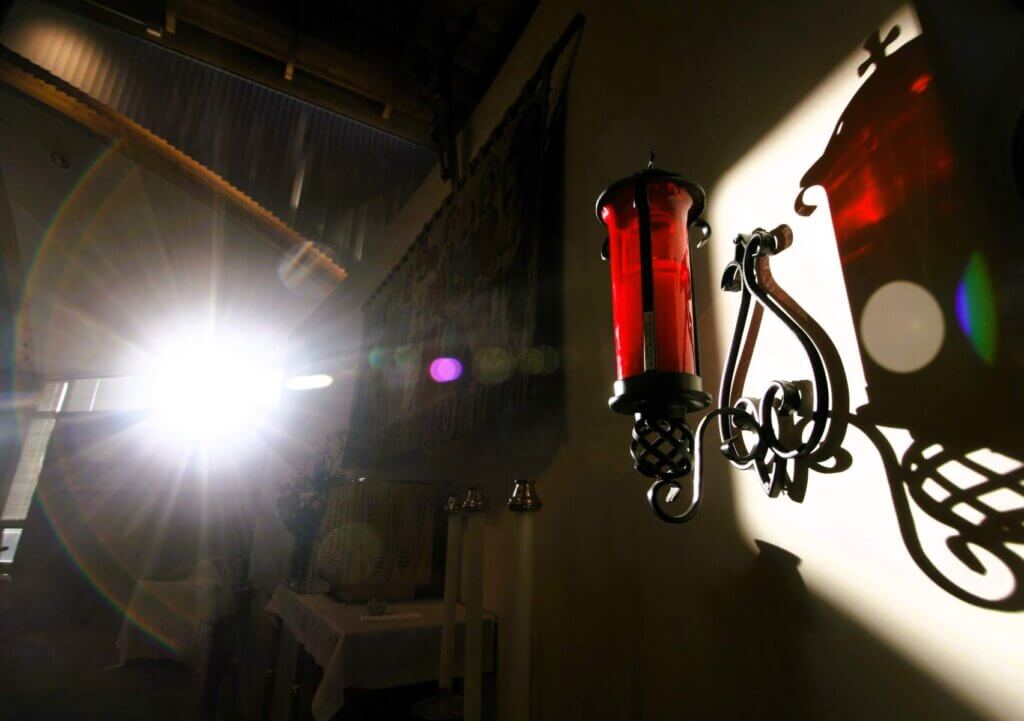
The sanctuary lamp burning near the tabernacle in our Abbey Church
On the Eucharist
A reflection for the Solemnity of Corpus Christi by Mother Maria-Michael Newe, OSB
Around the year 90 AD, the Didache recounts how important the Eucharistic celebration was for the early Christians:
“On the Lord’s Day of the Lord gather together, break bread and give thanks, after confessing your transgressions so that your sacrifice may be pure. Let no one who has a quarrel with his neighbor join you until he is reconciled by the Lord: ‘In every place and time let there be offered to me a clean sacrifice.”
Also, around 110 AD, St. Ignatius of Antioch wrote beautifully of the Eucharist:
“I have no taste for corruptible food nor for the pleasures of this life. I desire the Bread of God, which is the flesh of Jesus Christ, who was of the seed of David; and for drink I desire His Blood, which is love incorruptible.”
(Letter to the Romans 7:3)
“Take care, then, to use one Eucharist, so that whatever you do, you do according to God: For there is one flesh of Our Lord Jesus Christ, and one cup in the union of His Blood; one altar, as there is one bishop with the presbytery…”
(Letter to the Philadelphians 4:1)
“They [i.e. the Gnostics] abstain from the Eucharist and from prayer, because they do not confess that the Eucharist is the flesh of our Savior Jesus Christ, flesh which suffered for our sins and which the Father, in his goodness, raised up again.”
(Letter to Smyrnians 7:1)
And of course we have St. Justin Martyr’s (c. 100-165 AD) account of the Eucharistic celebration:
“For not as common bread nor common drink do we receive these; but since Jesus Christ our Savior was made incarnate by the word of God and had both flesh and blood for our salvation, so too, as we have been taught, the food which has been made into the Eucharist by the Eucharistic prayer set down by Him, and by the change of which our blood and flesh is nourished, is both the flesh and the blood of that incarnated Jesus.”
(First Apology, 66)
Origen (185-254 AD) writes of the care and concern for every particle of the Eucharist, that it would not fall on the ground:
“You are accustomed to take part in the divine mysteries, so you know how, when you have received the body of the Lord, you reverently exercise every care lest a particle of it fall, and lest anything of the consecrated gift perish….how is it that you think neglecting the word of God a lesser crime than neglecting his body?”
(Homilies on Exodus 13:3)
Oh that we had that much care and concern as the Church fathers and early Christians did for the Eucharist. But it begins with seeds. If a field has been heavily trampled upon, farmers have to re-seed it. It strengthens the old seed and makes it come up reinvigorated. We should be that seed. If we show reverence, adore the Eucharist, forgive everyone before we receive Him, have faith and belief, and most especially love, we plant the seeds to reinvigorate the Church. We should not be afraid to be vulnerable – even though it is the thing we most often want to run away from, it is often how God uses us most powerfully. If we learn to embrace this, we are like the seed that dies and is broken open, so that it may flourish. Become a seed. Become a saint. That is what God is looking for to reinvigorate His Church, that it may flourish.
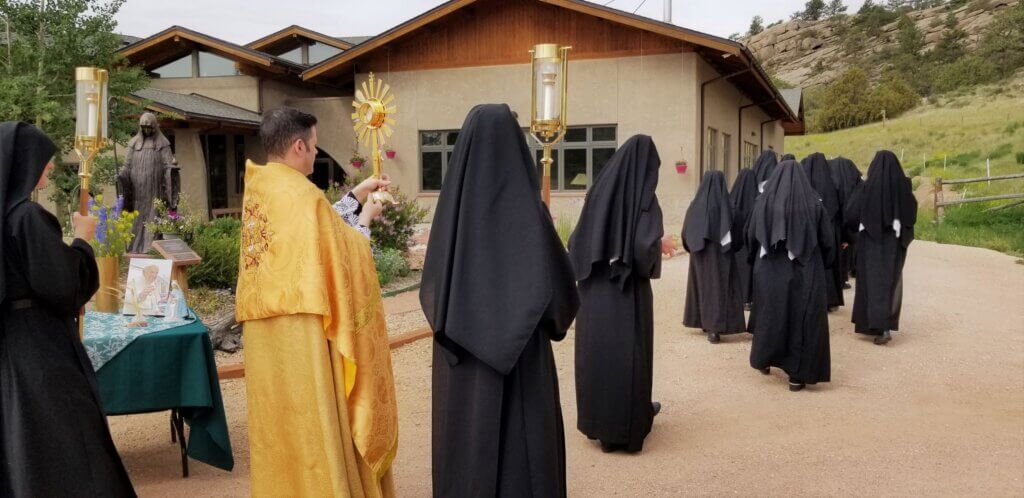
Last year’s Corpus Christi procession at the Abbey of St. Walburga
One Body, Many Parts
A reflection by Mother Maria-Michael Newe, OSB
If the whole body were an eye, where would the hearing be? If the whole body were hearing, where would the sense of smell be? But as it is, God placed the parts, each one of them, in the body as he intended. If they were all one part, where would the body be? But as it is, there are many parts, yet one body. The eye cannot say to the hand, “I do not need you,” nor again the head to the feet, “I do not need you.” …If [one] part suffers, all the parts suffer with it; if one part is honored, all the parts share its joy.
1 Corinthians 12:17-26, abridged

In Chapter 60 of the Holy Rule of St. Benedict we hear the words, “…friend, for what have you come?” (Rule 60.3). That is something we should always keep in mind. Paul knew that his mission was not to baptize, but to preach (cf. 1 Cor. 1:17). Baptizing is so important, but he knew that wasn’t what he was called to baptize. He was called specifically to preach the gospel. There were others to do the baptizing. Even Jesus clarifies that He wasn’t on earth to do everything, but specific things. And we have that also in the Church, where we are all called to different vocations (religious life, married life, single life, the priesthood); and there are religious orders to cover every area of service—those to help the poor, those who care for the sick, teachers, missionaries—you name it, the Church has it. And we as Benedictines are called to seek God continually, as the face of the Church running after Him. Our part is to seek Christ sincerely, with a great deal of love, calling out to Him, “Stay with us!” on behalf of the Church. There are specific things we are each called to do—what a gift that the Benedictine’s is to seek God. We give thanks that there are other people doing their parts to make up for what we lack. Through our lives of prayer, we are included in their works, because we are all part of the same Body of Christ, His Church.

